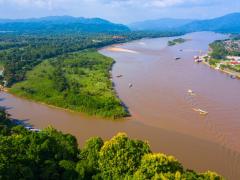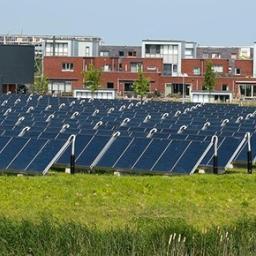Fifth Global Environment Outlook
'The world continues to speed down an unsustainable path despite over 500 internationally agreed goals and objectives to support the sustainable management of the environment and improve human wellbeing. However, meeting an ambitious set of sustainability targets by the middle of the century is possible if current policies and strategies are changed and strengthened and successful policies are rapidly scaled-up.' This conclusion is drawn in UNEP’s Fifth Global Environment Outlook (GEO-5), launched on the eve of the Rio+20 Summit.
PBL Netherlands Environmental Assessment Agency made an important contribution to the outlook by leading the assessment of scenarios, and analyzing different options for change.
Despite current trends, meeting an ambitious set of sustainability targets is possible, but requires transformative change
In looking into the potential for change, GEO-5 identified a selection of internationally agreed goals and targets that address the need to improve human well-being throughout the world, while protecting and using life-supporting environmental processes. Next, it assessed existing scenario studies with respect to achievement of these goals and targets. Also possible options for action to transition towards sustainable development were identified. PBL led the scenario assessment and contributed extensively to the assessment on options for transformative change in parallel to PBL’s recent report “Roads from Rio+20”.
The GEO report finds that existing scenario studies indicate that without greater efforts to implement appropriate short-term policies, it will not be possible to meet the set of sustainability targets. In other words, investments need to be shifted to long-term structural changes and rapid technology progress while also behavioral transformations seems necessary. Key responses would, for instance, include a rapid increase in energy efficiency, higher agricultural yields and a more efficient use of water resources. Still technical measures alone are not likely to have the required level of societal support if not accompanied by transformations at all leverage points (e.g. information provision, education and support for dietary changes). Finally, transitions need to reflect regional differences and priorities.
Accomplishing such complex transformations requires a gradual but steadily accelerating transition process. Some successful policy innovations are already happening, but need to be mainstreamed to be more effective. Broad-based social contracts grounded in jointly developed visions of a sustainable future would help to bring key stakeholders on board. Finally, given that environmental and societal Earth System changes can be slow, long-term visions and goals could help focus investments and technology development, induce societal change, and engage other actors in society. Global responses have a key role to play in setting goals and developing metrics, supporting capacity enhancement, generating financial resources and facilitating the sharing of best practices.
UNEP and PBL
In 1997, UNEP started to publish the Global Environment Outlook (GEO) reports, which provide analyses of the global interactions between environment and society. Under its core mandate of constantly ‘keeping the global environment under review’, UNEP has published a series of scientific assessments to which PBL - as one of the collaborating partners of UNEP - has made substantial contributions. For GEO-5, four PBL authors contributed to the report in the roles of (Coordinating) Lead Authors. PBL studies or studies in which PBL was involved are used extensively in the outlook and global responses chapter.
On May15th 2012, PBL has published: “Roads from Rio+20: pathways to achieve global sustainability goals by 2050. This report analyses how combinations of technological measures and changes in consumption patterns could contribute to achieving a set of sustainability objectives, taking into account the interlinkages between them. Both GEO-5 and Roads from Rio+20 conclude that, if we want to be successful in achieving sustainability goals, a new approach is needed, based on a shared vision for 2050 with long-term goals and consistent short-term targets and strong policy actions by governments with numerous civil and corporate initiatives worldwide.
Authors
Specifications
- Publication title
- Global Environment Outlook (GEO-5)
- Publication date
- 5 June 2012
- Publication type
- Publication
- Product number
- 92711




